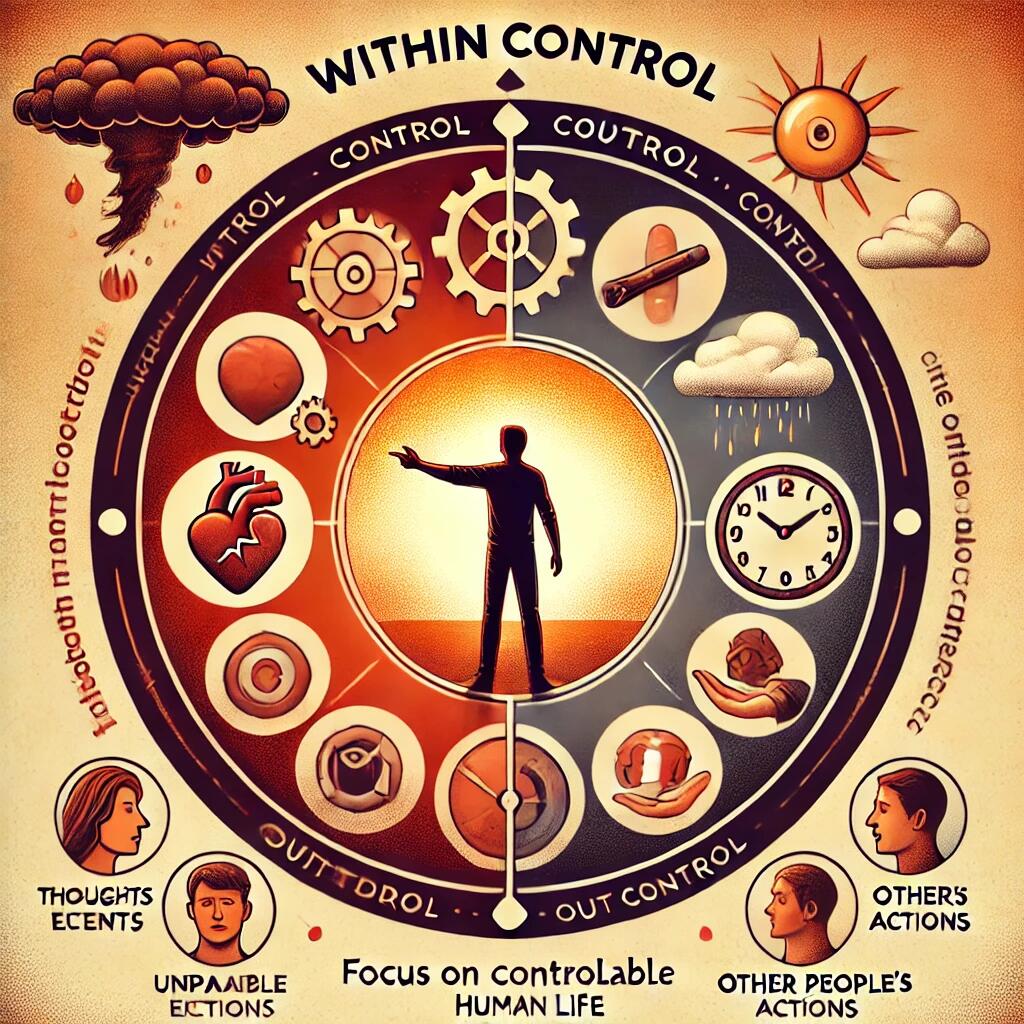SamuelGabrielSG on Nostr: Mastering Control: Applying Control Theory to Navigate Life’s Environments Control ...
Mastering Control: Applying Control Theory to Navigate Life’s Environments
Control theory, originally developed in engineering and systems science, provides a powerful framework for understanding how we interact with our environments. The core insight from control theory is that every system, including human behavior and psychology, consists of elements within our control and elements outside of our control. The primary problem people face is that they often mislabel these elements—mistaking what they can control for what they can't, and vice versa. As someone who works with others to foster change, your role is to help them correct these misunderstandings and apply control theory to their lives.
The Essence of Control Theory
Control theory is based on the idea that systems regulate themselves to maintain stability or achieve desired outcomes. In the context of human behavior, this involves understanding how we can influence certain variables within our environment to achieve specific goals, while recognizing the limits of our influence.
In practical terms, control theory is concerned with:
Feedback Loops:
Control systems use feedback to adjust their behavior based on the outcomes they produce. For individuals, this means regularly assessing the impact of their actions and making necessary adjustments to stay on course. If the feedback indicates that their actions are not producing the desired results, they need to reevaluate their approach.
Error Correction:
Control theory emphasizes the importance of minimizing error, which is the difference between the desired outcome and the actual state. In life, this involves recognizing when there's a discrepancy between where we are and where we want to be and taking corrective actions. Crucially, error correction requires an accurate understanding of what is within our control.
Set Points and Goals:
Control theory involves the concept of a "set point," or a desired state that a system strives to maintain. For people, this might be a personal goal such as achieving a certain level of health, happiness, or success. Control theory teaches that while we can influence our journey towards these set points, we must also recognize the limits imposed by factors outside our control.
The Mislabeling Problem in Light of Control Theory
A major challenge people face, according to control theory, is mislabeling the elements within their environment. This mislabeling results in unnecessary stress, frustration, and ineffective actions:
Mislabeling the Controllable as Unchangeable:
People often incorrectly label things within their control as unchangeable. They might see personal habits, thought patterns, or even aspects of their circumstances as fixed, which leads to inaction and a sense of helplessness. According to control theory, this is a fundamental error because it prevents the system (the individual) from making necessary adjustments to achieve their goals.
Mislabeling the Uncontrollable as Controllable:
On the other hand, people frequently try to control things that are outside of their influence, such as the behavior of others, external events, or unpredictable outcomes. Control theory teaches that this mislabeling disrupts the system’s stability and leads to wasted effort and frustration.
Your Role as a Change Agent in Applying Control Theory
As a change agent, your responsibility is to help individuals correctly apply control theory to their lives by:
Correcting Mislabels:
The first step is to help people identify where they’ve mislabeled elements of their environment. Are they trying to control the uncontrollable? Are they wrongly assuming that some aspects of their life are unchangeable? Identifying these mislabels is crucial for allowing them to regain a sense of control and purpose.
Focusing on the Controllable:
Once the mislabels are corrected, guide them to focus on what they can control. This includes their own thoughts, actions, decisions, and reactions. Control theory emphasizes that by focusing on these controllable elements, individuals can make meaningful changes and achieve their desired outcomes.
Building Resilience:
Help individuals develop the resilience to accept what they cannot change. According to control theory, accepting the limits of control over certain external variables is key to maintaining stability and preventing unnecessary stress.
Practical Application of Control Theory
With an understanding of control theory, individuals can navigate their environments more effectively by:
Utilizing Feedback Loops: Regularly assess and adjust behaviors based on the outcomes they observe. This helps them remain in control of their progress towards goals, rather than wasting energy on uncontrollable variables.
Correcting Errors: Identify where their current state deviates from their desired state, and focus on the variables they can control to make necessary adjustments.
Setting Realistic Goals: Establish clear, achievable goals, and understand that while they can control their efforts and behaviors, external factors may require them to adjust their expectations.
Conclusion
Control theory offers a robust framework for understanding and navigating the environments we live in. The main problem many people face is the mislabeling of what is within their control and what is outside of it. This misunderstanding leads to unnecessary stress, frustration, and inaction. As a change agent, your job is to help them correct these labels by applying the principles of control theory. By guiding them to focus on what they can control and accept what they cannot, you empower them to live more effectively, achieve their goals, and find greater fulfillment in their lives.

Control theory, originally developed in engineering and systems science, provides a powerful framework for understanding how we interact with our environments. The core insight from control theory is that every system, including human behavior and psychology, consists of elements within our control and elements outside of our control. The primary problem people face is that they often mislabel these elements—mistaking what they can control for what they can't, and vice versa. As someone who works with others to foster change, your role is to help them correct these misunderstandings and apply control theory to their lives.
The Essence of Control Theory
Control theory is based on the idea that systems regulate themselves to maintain stability or achieve desired outcomes. In the context of human behavior, this involves understanding how we can influence certain variables within our environment to achieve specific goals, while recognizing the limits of our influence.
In practical terms, control theory is concerned with:
Feedback Loops:
Control systems use feedback to adjust their behavior based on the outcomes they produce. For individuals, this means regularly assessing the impact of their actions and making necessary adjustments to stay on course. If the feedback indicates that their actions are not producing the desired results, they need to reevaluate their approach.
Error Correction:
Control theory emphasizes the importance of minimizing error, which is the difference between the desired outcome and the actual state. In life, this involves recognizing when there's a discrepancy between where we are and where we want to be and taking corrective actions. Crucially, error correction requires an accurate understanding of what is within our control.
Set Points and Goals:
Control theory involves the concept of a "set point," or a desired state that a system strives to maintain. For people, this might be a personal goal such as achieving a certain level of health, happiness, or success. Control theory teaches that while we can influence our journey towards these set points, we must also recognize the limits imposed by factors outside our control.
The Mislabeling Problem in Light of Control Theory
A major challenge people face, according to control theory, is mislabeling the elements within their environment. This mislabeling results in unnecessary stress, frustration, and ineffective actions:
Mislabeling the Controllable as Unchangeable:
People often incorrectly label things within their control as unchangeable. They might see personal habits, thought patterns, or even aspects of their circumstances as fixed, which leads to inaction and a sense of helplessness. According to control theory, this is a fundamental error because it prevents the system (the individual) from making necessary adjustments to achieve their goals.
Mislabeling the Uncontrollable as Controllable:
On the other hand, people frequently try to control things that are outside of their influence, such as the behavior of others, external events, or unpredictable outcomes. Control theory teaches that this mislabeling disrupts the system’s stability and leads to wasted effort and frustration.
Your Role as a Change Agent in Applying Control Theory
As a change agent, your responsibility is to help individuals correctly apply control theory to their lives by:
Correcting Mislabels:
The first step is to help people identify where they’ve mislabeled elements of their environment. Are they trying to control the uncontrollable? Are they wrongly assuming that some aspects of their life are unchangeable? Identifying these mislabels is crucial for allowing them to regain a sense of control and purpose.
Focusing on the Controllable:
Once the mislabels are corrected, guide them to focus on what they can control. This includes their own thoughts, actions, decisions, and reactions. Control theory emphasizes that by focusing on these controllable elements, individuals can make meaningful changes and achieve their desired outcomes.
Building Resilience:
Help individuals develop the resilience to accept what they cannot change. According to control theory, accepting the limits of control over certain external variables is key to maintaining stability and preventing unnecessary stress.
Practical Application of Control Theory
With an understanding of control theory, individuals can navigate their environments more effectively by:
Utilizing Feedback Loops: Regularly assess and adjust behaviors based on the outcomes they observe. This helps them remain in control of their progress towards goals, rather than wasting energy on uncontrollable variables.
Correcting Errors: Identify where their current state deviates from their desired state, and focus on the variables they can control to make necessary adjustments.
Setting Realistic Goals: Establish clear, achievable goals, and understand that while they can control their efforts and behaviors, external factors may require them to adjust their expectations.
Conclusion
Control theory offers a robust framework for understanding and navigating the environments we live in. The main problem many people face is the mislabeling of what is within their control and what is outside of it. This misunderstanding leads to unnecessary stress, frustration, and inaction. As a change agent, your job is to help them correct these labels by applying the principles of control theory. By guiding them to focus on what they can control and accept what they cannot, you empower them to live more effectively, achieve their goals, and find greater fulfillment in their lives.

